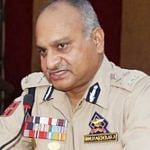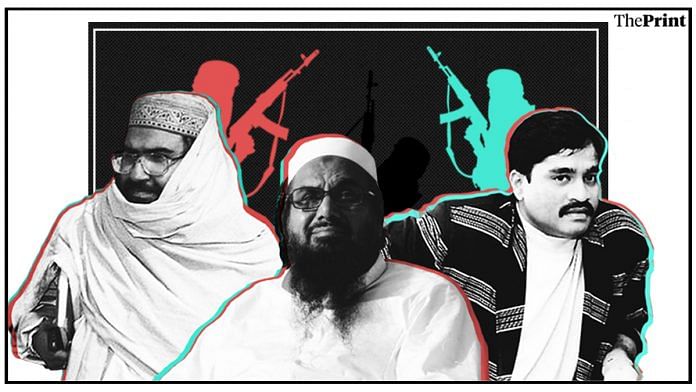India declared Lashkar-e-Taiba chief Hafiz Saeed, his deputy Zaki-ur-Rehman Lakhvi, Jaish-e-Mohammed chief Masood Azhar, and fugitive underworld don Dawood Ibrahim as terrorists Wednesday under the new Unlawful Activities (Prevention) Act. The US already has a $10 million bounty on Hafiz Saeed’s head, and India had banned both LeT and Jaish.
ThePrint asks: Will naming Masood Azhar, Dawood Ibrahim, Hafiz Saeed terrorists help India’s war on terror?
Modi govt’s move to designate these 4 terrorists is just a bureaucratic rearrangement that changes nothing
 Abhijit Iyer-Mitra
Abhijit Iyer-Mitra
Senior Fellow, Institute of Peace and Conflict Studies
Never have more electrons been inconvenienced or trees felled over nothing as the “major story” of India designating Hafiz Saeed and a band of jolly jihadis as terrorists individually. Going by the headlines you would think this was major, but it is just a bureaucratic rearrangement that changes nothing. In many ways, this move betrays India’s utter desperation at being unable to catch or extradite these men. A word on paper is being passed off as a substitute for action.
The purported legal case is that previously organisations were designated as terrorists, not individuals. This meant that individuals could change or rename their organisations. The problem is that the international community never took India’s guilt by association seriously. The global community and organisations like the UN have always worked on individuals based on evidence of guilt. This means as far as the world goes, nothing really changes, they’ll still evaluate terrorists on a case-by-case individual basis.
Actually, what’s worse is that it gives Pakistan an excuse to hand over low-rung operatives, instead of cracking down on the entire terror outfit and claim it is committed to fighting terror every time international pressure grows. Irrespective of the Narendra Modi government’s move, what does it change on the ground or diplomatically? Nothing. If you think anyone is more persuadable because of this re-designation, think again.
Also read: Hafiz Saeed, Masood Azhar to be first ‘individual’ terrorists under UAPA’s new provisions
What remains to be seen is how amended UAPA will be applied against these terrorists. That is where potential mischief lies
 Ajai Sahni
Ajai Sahni
Founding Member & Executive Director, Institute for Conflict Management
India’s move is, once again, too little, too late. In principle, the designation of both organisations and individuals as terrorists should be seen as a basic gear in the country’s counter-terrorism armoury.
It brings clarity and direction to those who have the official mandate to fight terrorists, even as it allows India to project its perspectives unambiguously to the international community. This move also eliminates the possibility of individuals escaping the consequences of their organisations being designated as terrorist by simply reinventing it under another identity. Take for instance the rebranding of Lashkar-e-Taiba as Jamaat-ud-Dawa, Falah-e-Insaniyat Foundation, Tehreek-e-Hurmat-e-Rasool, etc.
The Modi government’s move also puts in focus on India’s capacity to inflict punitive sanctions against such designated terrorists. There is no reason to believe that India is, in fact, in any such position to do so, or that this amended law would enable the country to take any action against this first list of designated terrorists, earlier excluded due to the infirmities of existing legislation.
Although, the present list of designated terrorists is unimpeachable, what remains to be seen is whether and how the UAPA law will be applied against individuals purportedly engaged in terrorist activities within and from India. This is where the potential mischief lies.
Designation of these four terrorists should be seen as exerting legal & diplomatic pressure on Pakistan
 K Rajendra
K Rajendra
Former DGP, Jammu & Kashmir
Under the amended UAPA, individuals can be designated as terrorists and restrictions can be placed on their travel and their properties can be seized by the National Investigation Agency without seeking the permission of state DGP. This, at times, would prove to be cumbersome and cause delay in expeditious action. So, special courts have been designated for speedy trials.
With the amendment in the UAPA, and declaration of Masood Azhar, Hafiz Saeed, Zaki-ur-Rehman Lakhvi and Dawood Ibrahim as terrorists, India has sounded the bugle on war against terrorism in a big way, signifying the urgency to tackle this scourge threatening our national security. While the United Nations has declared them ‘global terrorists’ with the US placing bounties on some of them, India, despite being the biggest victim of cross-border terrorism emanating from Pakistani soil where all the four terrorists are located, couldn’t do the same due to lack of enabling provisions in the UAPA earlier.
Merely declaring terrorists those already designated by the UN may not have any immediate impact on them but it will certainly have an impact on the ‘homegrown’ terrorists and preventing potential terrorist acts by taking appropriate preventive steps.
Having said that, our ‘surgical strike in Balakot in retaliation to the attack in Pulwama by Pakistan-based Jaish-e-Mohammed has set a new benchmark in our fight against terrorism and raised the cost for Pakistan. India will be well within its right to protect its sovereignty and integrity by targeting the ‘designated terrorists’ wherever they might be hiding. The designation of the four terrorists should be seen in the context of exerting legal and diplomatic pressure on Pakistan.
Also read: This is how China wants India to pay it back for listing Masood Azhar a terrorist
With this move, India is naming & shaming terrorists and bringing them to global notice
 Adil Rasheed
Adil Rasheed
Research Fellow, Institute for Defence Studies and Analyses
I think this is an important step because the world sometimes does not take seriously the enormity of the problems India faces. These terrorists have been behind some of the worst terrorist attacks internationally and in India. After the Modi government’s latest move, the word ‘terrorist’ will become a prefix to their name. The gravity of the situation should be known internationally, and these people should be shamed for the terror activities they have been involved in.
Due to the dubious nature of their deeds, these individuals are able to lurk in the shadows. They also, sometimes, obliquely accept that they are masterminds of terror attacks, but still manage to go scot-free. It’s an open secret as the UN has already recognised two of them as terrorists.
There is a sound basis for calling them out as terrorists, but naming and shaming them is also important. The propaganda that Pakistan has started against India should be known to the world. Pakistan has been fomenting terror in Jammu and Kashmir and other parts of India. So, it is important, in the present context that the world knows who has created this unwarranted crisis — Pakistan and these terrorists.
Azhar, Dawood, Saeed big names, designating them as terrorists won’t make a difference to India’s case
 Khalid Shah
Khalid Shah
Associate Fellow, Observer Research Foundation
When it comes to these big names, it does not make any difference to India’s case. There are already cases pending against the likes of Hafiz Saeed, Masood Azhar for planning various terror attacks. There is a clear understanding of who they are and what their activities have been.
After being designated as terrorists, groups started rebranding themselves, even though the individuals in those organisations remained the same. Now the Indian government can designate individuals even if the name and shape of their outfits change.
In light of the amended UAPA law, domestic terrorists can also be designated as terrorists. We should see how the government goes ahead with this, especially in the context of Kashmir.
The question is who will decide the criteria for designating someone a terrorist? That is not clear even in the amended law. Coming back to Kashmir, will over ground workers — who are non-combatants and don’t take part in any terror activity but provide logistical support — also be considered terrorists? How will these grey areas be dealt with by the Indian government?
This law gives teeth to Indian agencies because when individuals are declared terrorists, their property is sealed and they are barred from travelling.
When it comes to unknown names and faces the government thinks are involved in terror activities, it will make the government’s case stronger. India can then approach global forums and say an individual has been declared a terrorist under its law and ask for action against that individual.
Although the cautious application of the UAPA law may be useful, there is a possibility of it being misused.
By Taran Deol and Revathi Krishnan




Pakistan military needs ‘Kashmir’ and Indian baboos need the ‘jihadi thugs’ in limelight to keep the senses of their respective populations hypnotized, so that they don’t wake up and ask uncomfortable questions as to why they’re still living in the S***pit.
Prime minister Modi should order covert operations in enemy territory and eliminate these fugitives. Help from Israel is welcome.
In practical terms, a packet of potato crisps. These men are beyond the reach of Indian law, provided sanctuary by our adversary, used as assets to do us harm. If Pakistan could two time the United States, sheltering OBL it is unlikely to yield to any global pressure to hand them over. A time could come when the ISI decides their utility is over, and does the needful. Until then, the only worthwhile solution is to do what the Mossad does in such a situation.